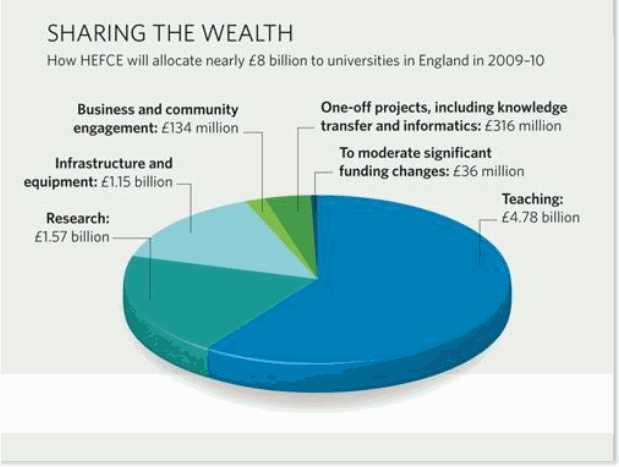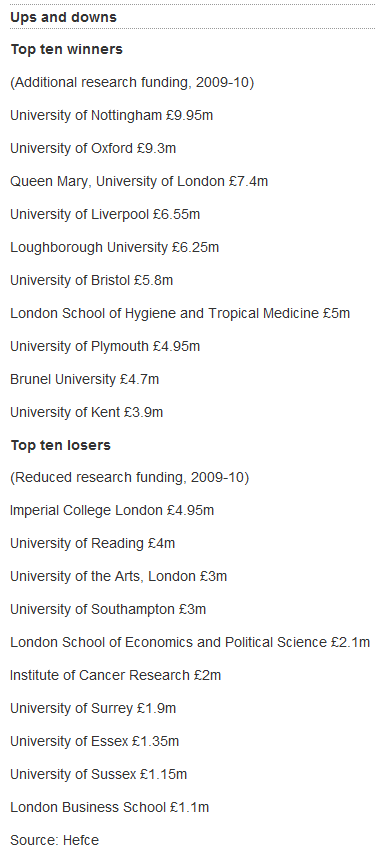|
|
|
|
|
|
|
News & Views item - March 2009 |
![]() UK's HEFCE University Funding Tables For 2009-10 Released. (March 6, 2009)
UK's HEFCE University Funding Tables For 2009-10 Released. (March 6, 2009)
The Higher Education Funding Council for England (Hefce), which will allocate some £1.6 billion of research funding based, with qualifications, on the results of the most recent Research Assessment Exercise (RAE), yesterday published its 2009-10 funding table.
Overall it will release close to £8 billion. The table the council released yesterday shows the overall proportions:

While the funding increase is 4% it should be noted that over the past year the rate of inflation was 3%.
As reported in The Guardian: "A total of 53 universities face cuts after being allocated below-inflation increases in funding for research and teaching for next year. The Russell group of leading universities complains that its members face some of the toughest reductions, and may be forced to lay people off. Imperial College London, University College London, King's College London and Cambridge all have funding allocations below the rate of inflation (currently 3%), while Oxford has increased its share by 4.7%."
Because the sciences have been singled out for preferential treatment by the Brown government, social sciences and the arts have been discriminated against and as a result the London School of Economics, for example, has been hit hard, suffering a hit of 13% in research funding.
Nevertheless, The Guardian notes that Imperial College London, University College London, Cambridge and Oxford share 27% of the 2009-10 research budget, but the Russell group as a whole receive a 3.3% increase in funding, just above the rate of inflation, while the 28 former polytechnics (the Million+ group) scored a 120% increased, admittedly, however, from a low base.
Put simply the grant allocations show that outstanding researchers in every subject, have both increased and are now more "democratically" situated since 2001 -- when the RAE was previously carried out -- but the funding available has not kept pace. Britain in contrast to the US has not designated significant additional funding toward research and higher education as a stimulus.
Malcolm Grant, chair of the Russell group, puts it this way: "If you don't receive a total grant that keeps pace with inflation, something has got to give. Across Russell group institutions, there will be reviews of staffing. Some institutions will want to reduce staff or not hire new staff. It's going to be quite tight."
On the other hand David Eastwood, chief executive of Hefce, said that the unit of resource for teaching had been maintained, and funding for research had increased by 7.7%, i.e. 4% above inflation. He did agree, however, that the universities still faced longer-term difficulties and would need to plan prudently and invest selectively.
Overall Australia looks to be following the UK and as a result, in the near future both nations will be staring at significant brain drain toward the US of its "best and brightest".
Still, look on the bright side, Malcolm Turnbull and Peter Costello in government would be fighting over who is the fiscally fairest in the land.

Credit: Nature
Below: English universities' short list of winners and losers.
